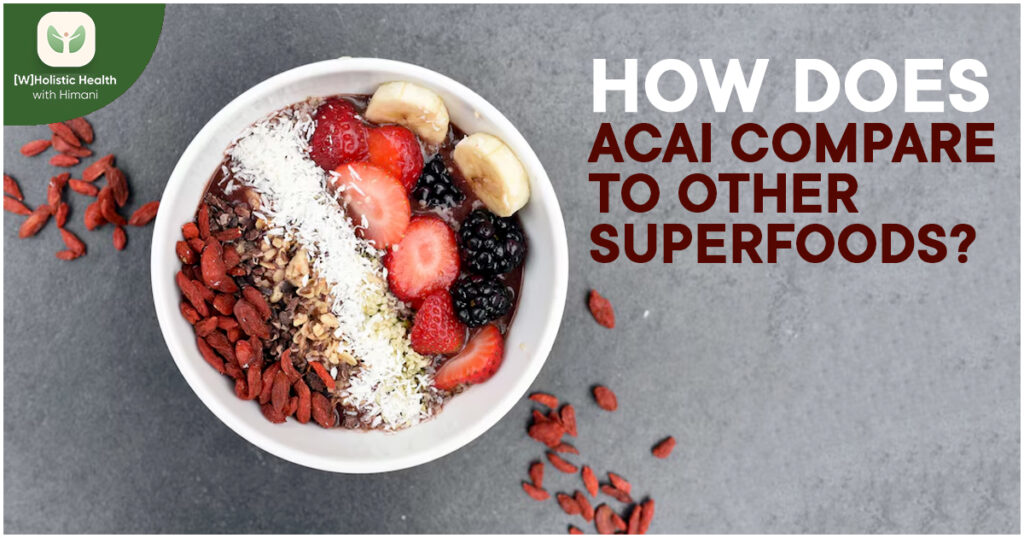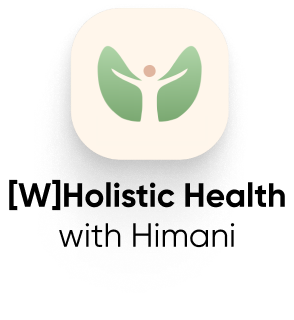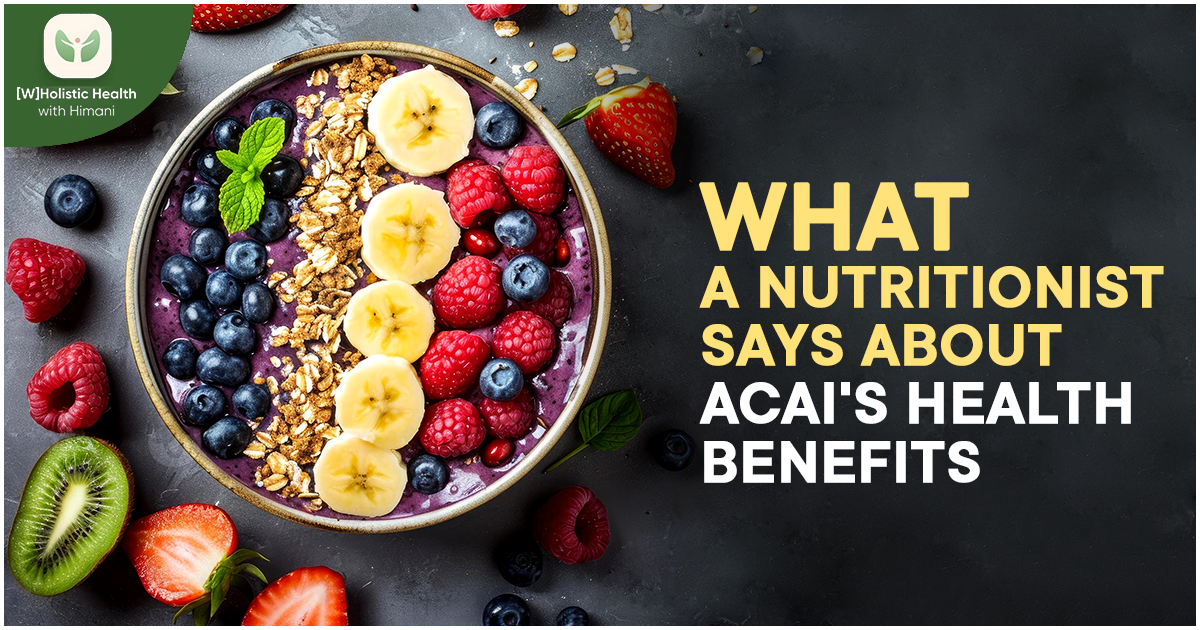Acai (Euterpe oleracea) is a small, deep purple berry that grows on the acai palm tree in Brazil’s Amazon rainforest. Over centuries, it has been integral to the diets of indigenous communities, who relied on it for nutrition, energy, and medicinal purposes. Today, acai is recognized globally for its exceptional health benefits, notably its remarkable antioxidant content, surpassing many other fruits and superfoods.
Table of Contents
ToggleWhat is Acai?
Acai berries are small, round fruits that grow on the acai palm tree, typically found in the swampy regions of the Amazon rainforest. The tree is known for its high tolerance to waterlogged conditions, making it well-suited to thrive in tropical climates. Acai berries are harvested from clusters of small purple fruits, similar in size to a grape but with a large pit in the center, leaving only a tiny edible portion of the fruit.
Check Out our custom health programs.
Historically, acai has been a key food for the indigenous tribes of the Amazon, who used the fruit as a staple in their diet. They consumed acai in various forms, often blended with other fruits or served as a thickened paste, sometimes mixed with fish, cassava, or other local ingredients. These traditional preparations helped provide the necessary nutrients to sustain the tribes through challenging environments.
Read More: Everything You Need to Know About Kidney Health and Care
Nutritional Profile of Acai (Per 100g)
Acai is known for being nutrient-dense, containing various essential nutrients and health-boosting compounds. Below is a breakdown of its nutritional composition:
- Calories: 70 kcal
- Fats: 4.5g (including healthy omega-3, omega-6, and omega-9 fatty acids)
- Dietary Fiber: 2-3g
- Protein: 1g
- Vitamin A: 15% of the recommended daily intake (RDA)
- Antioxidants (ORAC): 102,700 (per 100g of freeze-dried acai powder)
Key Nutrients in Acai
- Antioxidants: Acai is renowned for its high concentration of antioxidants, particularly anthocyanins and flavonoids. These compounds are crucial in combating oxidative stress linked to aging, chronic diseases, and cell damage.
- Healthy Fats: Acai contains a balance of omega-3, omega-6, and omega-9 fatty acids, essential for maintaining healthy cell function, reducing inflammation, and supporting heart health.
- Fiber: Acai provides 2-3 grams of dietary fiber per 100 grams, aiding digestion, promoting gut health, and helping regulate appetite.
- Vitamins and Minerals: Acai is a rich source of vitamin A, which supports vision and immune function, as well as calcium and iron, essential for bone health and oxygen transport in the blood.
Health Benefits of Acai
Acai’s diverse range of nutrients offers several health benefits, from improving heart health and cognitive function to supporting the immune system and promoting digestive health. Below are the key health benefits of incorporating acai into your diet.
Read More: Liver Health Essentials: Your Guide to a Healthy Liver
Antioxidant Properties Of Acai Berries
Acai’s powerful antioxidant content makes it one of the best fruits for fighting oxidative stress. Oxidative stress occurs when more free radicals are in the body than antioxidants to neutralize them, which can lead to inflammation and damage to cells. The high levels of anthocyanins in acai—compounds responsible for its deep purple color—help reduce free radical damage.
Research from the Journal of Agricultural and Food Chemistry indicates that acai has more antioxidants than many commonly known fruits, including blueberries. It is reported to have twice the antioxidant content of blueberries and ten times more than grapes. These antioxidants are linked to various health benefits, such as:
- Reduced Risk of Chronic Diseases: Antioxidants help prevent diseases like heart disease, cancer, and diabetes by neutralizing harmful free radicals.
- Skin Health: Acai’s antioxidants also protect skin cells from damage, promoting better skin elasticity and reducing signs of aging, such as wrinkles and fine lines.
Heart Health Benefits
Thanks to its combination of healthy fats, antioxidants, and fiber, Acai is particularly beneficial for heart health. Acai helps reduce the levels of LDL (low-density lipoprotein) cholesterol, often referred to as “bad” cholesterol, while increasing HDL (high-density lipoprotein) cholesterol, which is considered “good” cholesterol. These effects help reduce the risk of cardiovascular diseases such as heart attack and stroke.
Additionally, acai’s high potassium content is vital in regulating blood pressure. Potassium helps balance sodium levels in the body, reducing the strain on the cardiovascular system and maintaining healthy blood pressure levels. Research has shown that regular consumption of acai may contribute to:
- Lowered LDL Cholesterol: Acai has been shown to reduce LDL cholesterol by as much as 15%, helping to decrease the risk of plaque buildup in the arteries.
- Increased HDL Cholesterol: Acai increases HDL cholesterol by 12%, crucial for removing excess cholesterol from the bloodstream.
- Improved Arterial Flexibility: Acai enhances arterial flexibility, improving circulation and cardiovascular health.
Brain Function and Cognitive Health
Acai is also known to support brain health by reducing oxidative stress in the brain, which is a significant factor in neurodegenerative diseases such as Alzheimer’s and Parkinson’s. The polyphenols in acai protect brain cells from damage and have neuroprotective properties.
- Improved Memory: Studies have shown that acai may improve working memory and reduce cognitive decline. A 2023 study published in Nutritional Neuroscience revealed that regular acai consumption improved memory in patients with early-stage Alzheimer’s disease.
- Mood Regulation: Acai’s antioxidants and omega-3 fatty acids also improve mental health by reducing neuroinflammation and helping regulate mood. Acai’s compounds support the production of serotonin, a neurotransmitter responsible for mood stabilization.
Digestive Health Benefits
Acai is a great fiber source, essential for maintaining a healthy digestive system. The fiber in acai helps promote regular bowel movements, prevent constipation, and maintain a balanced gut microbiome.
- Gut Microbiota: Research shows that acai helps increase beneficial gut bacteria, supporting overall digestive health. It also aids nutrient absorption, making the body absorb essential vitamins and minerals more efficiently.
- IBS Relief: Acai’s anti-inflammatory properties may also help alleviate symptoms of irritable bowel syndrome (IBS), such as bloating and abdominal pain.
Immune Support
Acai boosts the immune system, enhancing the body’s ability to fight infections and illnesses. Acai has been shown to stimulate the activity of natural killer (NK) cells, which play a critical role in the immune response.
- Enhanced Immune Function: Acai increases NK cell activity by 45%, helping the body fight off infections more effectively.
- Reduced Infection Recovery Time: Studies show that acai can reduce infection recovery time by 35%, making it an effective immune booster.

How Does Acai Compare to Other Superfoods?
While many superfoods claim to offer similar health benefits, acai stands out due to its exceptional antioxidant content. A study published in the Journal of Agricultural and Food Chemistry found that acai has more than double the antioxidant content of blueberries, a fruit long regarded as one of the best sources of antioxidants.
Read More: Overnight Oats: The Ultimate Guide to a Nutritional Breakfast
In addition to its antioxidant properties, acai also provides a unique combination of fiber, healthy fats, and vitamins, making it particularly beneficial for heart, brain, and digestive health. Compared to other popular superfoods like goji berries, pomegranates, and mangosteen, acai holds a superior position in terms of overall nutrient density and antioxidant capacity.
Incorporating Acai Into Your Diet
Acai’s versatility makes it easy to incorporate into various meals and snacks, from smoothies to breakfast bowls, desserts, and even savory dishes. Below are some ideas on how to enjoy acai:
Acai Smoothie Bowls
Acai smoothie bowls are a popular way to enjoy acai, allowing for customization with various toppings. A basic acai bowl can be made by blending frozen acai puree with fruits like bananas and berries and a liquid like almond milk. Popular toppings include:
- Granola
- Chia seeds
- Fresh fruit (such as kiwi, strawberries, or blueberries)
- Nuts (such as almonds or walnuts)
- Coconut flakes
Acai Breakfast Recipes
- Acai Oatmeal: Add acai puree or acai powder to cooked oatmeal for a nutrient-packed breakfast. Combine with chia seeds, nuts, and fresh fruit for a well-rounded meal.
- Acai Pancakes: Incorporate acai powder into pancake batter for a vibrant, healthful breakfast. Top with fresh berries, honey, or nut butter.
Savory Acai Dishes
While acai is often used in sweet dishes, it can also be incorporated into savory recipes. In Brazil, acai is sometimes used as a sauce for fish or poultry, where it is combined with garlic, spices, and herbs to create a unique flavor profile.
Acai and Weight Management
Acai can be a helpful addition to a weight management plan due to its fiber content, healthy fats, and ability to regulate appetite. Acai’s fiber helps prolong feelings of fullness, prevent overeating, and reduce overall calorie intake.
- Boosting Metabolism: Acai has been shown to improve fat metabolism and energy regulation, supporting weight loss and management efforts.
- Suppressing Appetite: Acai helps control hunger by reducing levels of appetite-regulating hormones, which leads to longer-lasting satiety.
Conclusion: The Benefits of Acai for Overall Wellness
Incorporating acai into your diet offers numerous health benefits, from supporting heart health and cognitive function to boosting the immune system and promoting digestive health. Acai’s antioxidant properties and rich supply of fiber, healthy fats, and essential nutrients make it an excellent addition to a balanced diet. Whether in smoothie bowls, oatmeal, or savory dishes, acai is a versatile superfood that can enhance your health and well-being.
By consuming acai regularly, you can harness its numerous benefits for weight management, enhanced athletic performance, improved skin health, and a more muscular immune system. As part of a holistic approach to health, acai can be a powerful tool in reducing the risk of chronic diseases and supporting a vibrant, energized lifestyle.

I’m Himani, a Singapore-based health coach certified by IIN. I help clients create personalized nutrition and lifestyle plans that lead to lasting health goals. By focusing on individual needs, I provide actionable steps to support your journey to optimal well-being










